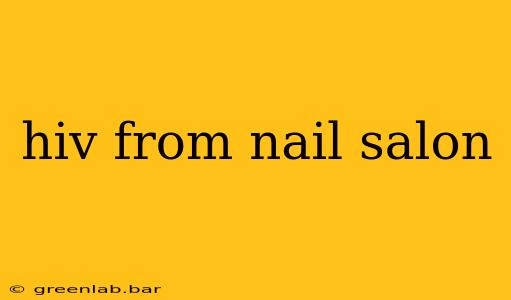The question of whether you can contract HIV from a nail salon is a valid concern, prompting many to seek clarification on the transmission of this virus. While the possibility might seem alarming, the reality is that the risk of HIV transmission in a nail salon setting is incredibly low, bordering on nonexistent, when proper hygiene and safety protocols are followed. Let's delve into the specifics.
How HIV is Transmitted
To understand the risk, we must first understand how HIV is actually transmitted. HIV, the virus that causes AIDS, is primarily transmitted through:
- Sexual contact: This includes vaginal, anal, and oral sex.
- Sharing needles: Intravenous drug use with contaminated needles is a significant risk factor.
- Mother-to-child transmission: From mother to child during pregnancy, childbirth, or breastfeeding.
- Blood transfusions (rare in developed countries): Highly regulated blood banks minimize this risk considerably.
Nail Salons and HIV Transmission: Breaking Down the Myth
The crucial point to grasp is that HIV cannot survive outside the body for extended periods. Unlike some viruses, it doesn't linger on surfaces. Transmission requires direct contact with infected blood or bodily fluids.
While minor cuts or abrasions are possible during a manicure or pedicure, the amount of blood involved is usually minimal. Even if a tiny amount of infected blood were present (a highly unlikely scenario given sanitation practices), the chance of transmission through a superficial wound is extraordinarily small.
Factors Minimizing Risk in Reputable Salons:
- Proper sterilization: Reputable nail salons meticulously sterilize their tools using autoclaves, which utilize high-pressure steam to eliminate virtually all viruses and bacteria.
- Single-use items: Many salons use disposable files, buffers, and other tools, further reducing the risk of contamination.
- Gloves: Licensed technicians should wear gloves throughout the service.
- Cleanliness: A clean and well-maintained salon significantly reduces the potential for any infectious agent transmission.
When Concerns Might Arise
While the risk is minuscule, there are situations where caution should be exercised:
- Unsanitary Salons: Salons with poor hygiene practices and inadequate sterilization techniques pose a higher (though still low) risk of various infections, not just HIV. Always choose reputable, clean salons with good reviews.
- Visible Blood: If you see any visible blood during your service, immediately alert the technician and request a new set of sterilized tools.
Conclusion: Prioritize Hygiene and Choose Wisely
The chance of contracting HIV from a nail salon is extremely low, provided the salon adheres to standard hygiene and safety regulations. Choosing a reputable salon and observing the cleanliness of the environment are far more important factors to consider than the theoretical risk of HIV transmission. Focus on selecting a clean and well-maintained establishment, and if you have any concerns, don't hesitate to ask the salon about its sterilization procedures. Educating yourself about proper hygiene practices is crucial for overall health and wellbeing.

